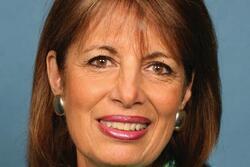Talking Abortion, Stigma, and Storytelling with The Sea Change Program
Last month, JWA's podcast Can We Talk? reflected on the founding of the women's health collective Our Bodies Ourselves. Hearing founder Vilunya Diskin talk about fighting for reproductive rights in the late 1960s and early 1970s, including access to safe abortions, turned my thoughts to where we stand today. Abortion has been legal since Roe v. Wade was decided in 1973, but stigma against women who get abortions seems more pervasive than ever. With abortion making headlines again as the subject of political debate, it can be difficult to cut through the noise and hear what real women are experiencing outside of the media glare.
Enter, Sea Change: The Sea Change Program is a nonprofit dedicated to shifting sexual and reproductive stigma so that all people can live with dignity and respect. Sea Change helps shed light on everyday stories that have been in the shadows for too long. Stories that have the power to change conversations and beliefs in favor of what is required—from legislators, family members, and peers—to lead safe and healthy reproductive lives.
As one of the co-founders of Sea Change, Managing Director Steph Herold works to give direction to their programmatic work, leading their work in media advocacy, communications, and storytelling. We spoke to Steph about abortion stigma, the state of reproductive rights in America today, and the relationship of Jewish women to women's health.
Why is it important to reduce stigma around abortion?
Whether we realize it or not, abortion stigma is all around us. From the television shows we watch where characters who seek an abortion are portrayed as immoral or selfish, to the legislature and policies proposed by politicians who are fighting to reverse Roe v. Wade and a person’s right to decide what is best for their own body and life. When someone is shamed for their personal sexual or reproductive decisions, it can lead to isolation and silence, both of which can be detrimental to one’s emotional health. We can’t change the national conversation around abortion without starting at a place like the dinner table. It’s essential that we continue to discuss the normalcy of abortion, the stories behind the decision, and the harassment people experience in trying to access abortion. Having these open conversations can help to create a shift in our culture – a shift towards compassion and empathy rather than shame and stigma.
How does storytelling help you meet that goal?
Every day, people around us are having similar thoughts, thinking they should be very careful about who they open up to about their sexual history, abortion, gender-affirming hormone treatment, or being a young parent. These everyday experiences are treated as taboo, and instead of being taught to share these experiences and support other people through them, we are taught to fear and betray our bodies and our full selves. And that silence impacts the way so many of us are able to access—or are flat-out denied—our sexual and reproductive rights. But what if we stopped being silent? What if our experiences were seen as a source of wisdom rather than shame? We can begin to undo the stigma and shame associated with so many sexual and reproductive experiences by sharing our stories with people we know and supporting them when they share their stories with others. That ripple effect will begin to restore dignity and humanity to our policies, our culture, our bodies, and our lives. It’s much easier to deny us access to the health care we need if we are afraid to even talk about it. When we speak up and stop allowing preachers and politicians to make us, our friends, or our family members feel badly about perfectly reasonable life choices and experiences, we open the door to creating a country where the policies and practices reflect our real lives.
Can you tell us about The Untold Stories Project?
The Untold Stories Project is an exciting project modeled after book clubs, that allows groups of friends, colleagues, or family to gather after reading our book of first person, non-fiction essays, Untold Stories: Life, Love, and Reproduction, and then host a group conversation over food or drinks. The book explores the sexual and reproductive experiences of 17 people who talk about what it is like to grow up as an intersex person, have an abortion, place a child for adoption, experience infertility, go through a gender transition as a parent, and much more. It's a great opportunity to dive deeper into issues that matter, yet for so many of us, we have a hard time starting a conversation about them. What’s amazing is how well this storytelling and sharing model works! In our first year, our evaluation of the project revealed that a majority of readers said that participating in the project was ”eye-opening” and made them “more open to the nuance of reproductive experiences.” It really opens the door to sharing, and we have big plans this year, expanding and starting new book groups across the country, sharing it with professors at universities, and creating an audiobook to reach new audiences.
It’s a scary time for reproductive health in America—just yesterday, Florida legislators voted to defund Planned Parenthood. How are you reacting, as an organization, to increased hostility toward abortion providers and women who choose to get abortions?
We are dedicated to making the voices of those who experience abortion, those who provide it, and those who support it louder. Our voices and stories need to reflect the reality of abortion – that it’s normal, can strengthen relationships between people, and is often not a big deal – and carry farther, reaching the minds and hearts of those who may not realize the commonality of abortion in our country and those who have misconceptions or misinformation about it. We want to inspire each and every person to lean into empathy and compassion, inspiring others to respect the personal choices of others. We are working to create a world where all sexual and reproductive choices are treated with dignity, where no one is ashamed to live their life the way they want. For every story of harassment and hostility, there is a story of compassion, support, and inspiration. And it’s our mission to ensure those experiences are heard.
We’re hearing about women in Texas driving all day to reach an abortion clinic, and worse, resorting to illegal abortions because they are unable to take off work to reach a far-away clinic. What do these “backward steps” mean for Americans?
Rigorous public health research tells us that making abortion harder to access doesn’t dissuade people from having abortions. The fact is that abortion is a normal part of health care, just like birth control or a Pap smear. Yet, it comes with a special stigma reserved for few other areas of reproductive health. We’re working to help people see that you can disagree with abortion theoretically and still support the people you love who will have abortions. No matter how you feel about abortion, people will still have them. People you love – sisters, cousins, aunts, girlfriends, daughters, mothers. Using this framework helps people to see that onerous anti-abortion laws have a real negative impact on the lives of their loved ones. No one deserves to be bullied, harassed, or attacked when walking into a clinic, no matter what service they’re accessing. No clinician should have to check their cars for explosives or worry about being followed home. We must keep talking and increasing awareness about the realities of abortion to ensure our legal right to choose is not just protected, but respected and expanded.
Jewish women have long been advocates for women’s health, and during the Women’s Liberation Movement emerged as founders of organizations like Our Bodies Ourselves and the National Women’s Health Network. Why do you think Jewish women have been at the forefront of the women’s health movement?
I’m not a historian, but my guess is that this has to do with deeply held Jewish values of social justice. From Queen Esther to Ruth Bader Ginsberg, Jewish women have a storied history of fighting for our own rights and the rights of other marginalized people. I also think it has to do with having a complex insider/outsider status when it comes to privilege in the United States. For Jews who identify or pass as white, we can move through society with a certain amount of racial and ethnic privilege, yet are steeped in a history of being outsiders who’ve faced discrimination, oppression, even genocide. For many people, that history guides their activism, and serves as a mandate to fight for social justice, whether that’s being on the front lines of abortion rights work or standing in solidarity with the Black Lives Matter movement. I think for many Jews, especially Jews of Color, fighting for social justice is not just a matter of principle, but a matter of fighting for our lives.
What do you say to someone who is anti-abortion on religious grounds?
It really depends on who you’re talking to and what faith they come from. If they are Christian, I’d rely on resources from organizations like Catholics for Choice and Religious Coalition for Reproductive Choice to give the tools to be able to talk about abortion in a way that makes sense to Christians, that respects their faith instead of vilifying it. Someone who does this extremely well is Dr. Willie Parker, who underscores that his deep Christian beliefs actually compel him as a physician to provide abortion care. He draws on parables like the Good Samaritan that are deeply personal and meaningful to a lot of practicing Christians I know, both pro-choice and anti-abortion. What I always try to remind myself is that access to abortion isn’t just about the legal right to a medical procedure – it’s also about believing that all people deserve empathy, hope, compassion, and kindness, including people who’ve had abortions and abortion providers.
How can readers who want to get involved in the Sea Change Program do so?
Check out our Untold Stories Project and all the ways you can get involved – from hosting a book club to getting friends or family members to sign up. Also be sure to follow us on social media, where readers can get up-to-date info on news, events, and our work. (Facebook: SeaChangeProgram; Twitter: SeaChangeProg; Instagram: seachangeprogram] You can learn more about our work, including Untold Stories and capacity building, at our website – www.seachangeprogram.org - where you can join our listserv and even make a donation to our work.






